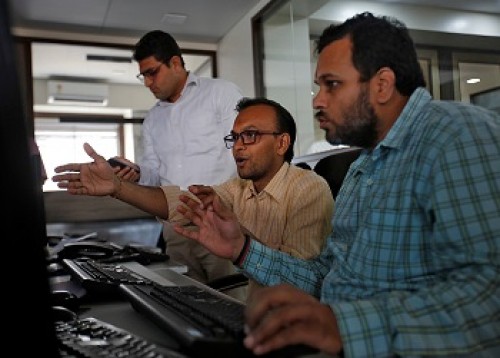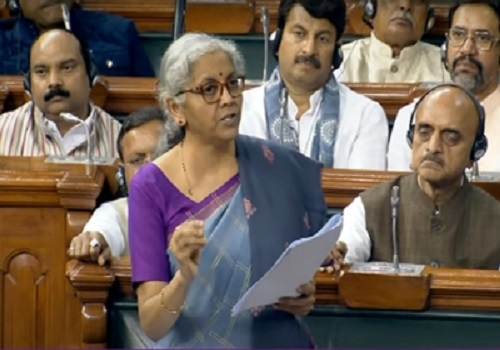India Strategy - Second wave unlikely to prevent cyclical recovery; will extend accommodative stance of central banks By ICICI Securities

Follow us Now on Telegram ! Get daily 10 - 12 important updates on Business, Finance and Investment. Join our Telegram Channel
Second wave unlikely to prevent cyclical recovery; will extend accommodative stance of central banks!
* Equities favourably placed in the cycle: Despite the significant impact of Covid, cyclical upturn is visible in corporate profits and economic growth while credit and investment cycles are clearly bottoming out along with the strengthening of corporate balance sheets. Although it is difficult to gauge whether these trends are part of a structural super cycle or a shorter term cycle, it is amply clear that we are closer to the bottom of the cycle in terms of corporate profits, economic growth, credit growth and capex while consensus optimism is missing. The above environment has typically not been a precursor for large drawdowns in equity markets. Current phase of ‘stock price consolidation’ and ‘continued earnings traction’ will result in market valuations retreating from stretched levels.
* Second wave of Covid has delayed the recovery process, but not prevented it: Going by the experience in developed markets (DMs) like the US, the more infectious second wave during Q4CY20 did not have any material impact on economic recovery (in fact, US GDP growth forecast was raised to 4.3% during Q4CY20). We believe, India, with limited lockdowns in a few states, will show similar trends with the organised corporate sector getting impacted even less than the unorganised sectors. However, the spectre of rising Covid cases has prodded the RBI to continue its accommodative stance (new initiatives towards QE include G-SAP 1.0 while extending earlier programs like TLTRO by six months). We saw similar commitment by the US Fed and the ECB last month, which should keep global liquidity conditions comfortable.
* Increased vaccination drive is boosting confidence, especially in DMs: DMs like the US saw the peaking of the second wave of Covid in Jan’21. Since vaccines became available, the rate of vaccination per day in the DMs has also shot up, which will boost confidence. India on the other hand has seen the second wave start in Mar’21 with a much slower rate of vaccination to start with, but has climbed significantly to >3mn per day thereby making India the fastest country to administer >100 mn doses.
* INR to stabilise as factors remain largely conducive: Despite the recent volatility, INR should remain stable on: a) India’s improving growth outlook and record-high forex reserves of US$577bn; b) oil price scare ebbing and robust government tax revenues in FY21 at Rs20.16tn against the FY21 RE of 18.95 tn and FY20 actuals of Rs20.04tn; (c) foreign flows (FDI + FPI) continue to be positive on a trailing one-month basis with the exception of outflows from bonds. On the factors that could put pressure on INR are the significant rise in Covid cases, rise in US bond yields and signs of rising inflation although it still remains within the comfort zone of RBI at 5.5%.
* Global growth outlook improved but rising second wave brings downside risks: The IMF projected the global economy to grow 6% (upped 50bps from the previous forecast) in 2021 and 4.4% in 2022 in the latest World Economic Outlook, April 2021. The upward revision reflects additional fiscal support in a few large economies, the anticipated vaccine-powered recovery in the second half of 2021, and continued adaptation of economic activity to subdued mobility. India in particular stands out as the fastest growing economy both for FY22 and FY23 at 12.5% and 6.9% respectively
* Consolidation phase resulting in sector rotation and improving valuation profile of the market: Consolidation phase for Indian equites since mid Feb’21 and the return of ‘time value of money’ as earnings base continues to advance (driven by cyclicals and depressed earnings) will result in lower valuations for headline index (refer our note on ‘Time value of money’). During the current consolidation phase, small-caps (+3%) and mid-caps (+1%) indices have significantly outperformed NIFTY50 (-5%) while value stocks continue to outperform.
* We continue to be overweight on cyclicals (banks, industrials, selectively auto), defensives with high dividend yield (utilities), or improving earnings profile (telecom, pharma).
To Read Complete Report & Disclaimer Click Here
For More ICICI Securities Disclaimer https://www.icicisecurities.com/AboutUs.aspx?About=7
Above views are of the author and not of the website kindly read disclaimer
























